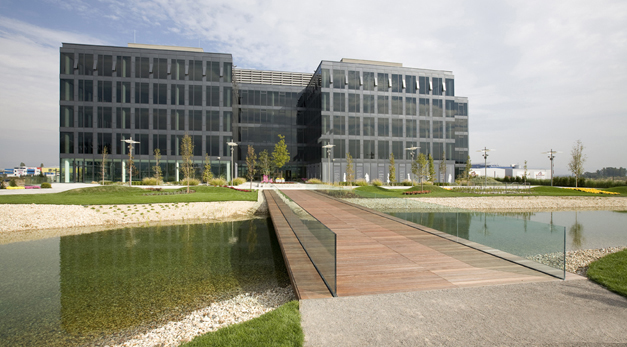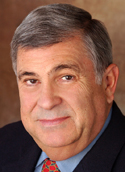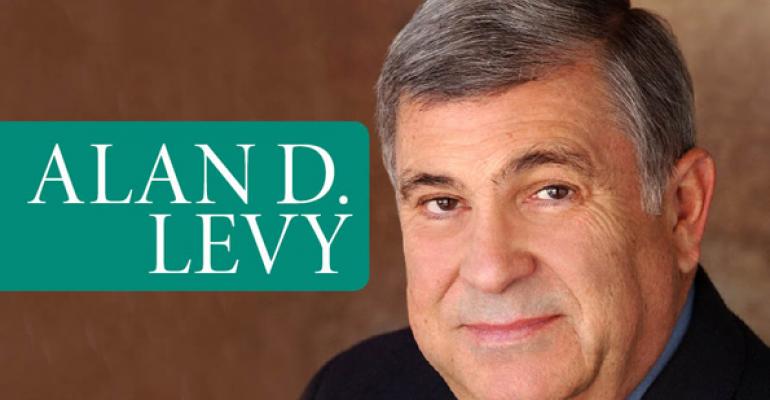
An artificial lake helps to cool a modernizing nation’s soon-to-be first LEED-certified office building, located in Tishman International’sSofia Airport Center (SAC), a mixed-use complex built on formerly under-utilized land adjacent to the international airport in Sofia, Bulgaria. Our commitment at Tishman to add value to SAC by using the project to model Western-style green building strategies has made our firm the pioneer of a new era in sustainable commercial real estate development in Bulgaria and Eastern Europe.
Water conservation was an important strategy in the planning of SAC, and we utilized low-flow bathroom fixtures with automatic sensor-activated controls. Also, one energy-conserving measure incorporated into SAC was windows that can be opened to let in breezes that naturally cool the interior spaces in pleasant weather. In addition, we created a lake at SAC—not only as the centerpiece of SAC’s sustainably landscaped campus, but also as a retention pond to minimize rainwater runoff and erosion during heavy storms.
We also drilled wells onsite to provide natural water for irrigation and to maintain lake levels throughout the year. Water circulates throughout the SAC developmentfor diverse uses. The outdoor landscaping, a pleasant visual statement of the principles of sustainable development, plays a leading role on the Sofia Airport Center site with its gently sloping and elliptical hills. Plant species were chosen for their suitability to the country’s climate and soil conditions and for compliance with the LEED certification requirements concerning the use of native plants and the proximity of seed supplies. We also used certain underground and edging technologies that were innovations for Bulgaria. The goal was to create a plant ecosystem that would become easier to care for as it matured. A key to creating a sustainable landscape was to include plants that were either native to the area or already well adapted to the local growing conditions. Generally, these types are better adapted to local growing conditions, less prone to disease and insect problems, and provide a better habitat (food and shelter) for native wildlife than introduced species. Thoughtful plant selection and proper site preparation created a sustainable landscape that reduced greatly the need for water, required no fertilizer and minimizes labor.
Indoors, the HVAC system uses variable air volume (VAV) technology. This system is highly efficient because the minimal required amount of air is used to keep the space at its design temperature. The fans in the air-handling units can run at slower speeds (through the use of a very efficient variable speed drives) and the amount heating and cooling demand can be reduced. The system’s automated fan control, especially with modern electronic variable speed drives, substantially reduces the total cooling energy requirements of the building. In essence, the VAV system allows the building’s HVAC systems to run optimally, sometimes at partial loads, therefore overall more efficiently. VAV systems are commonly used in offices because of their high efficiency, their ability to provide independent temperature control, and their flexibility that allows them to easily be moved into to accommodate office renovations.
The incorporation of efficient and self-sufficient irrigation systems and landscape plantings designed for low water consumption allowed us to build indoor and outdoor green spaces throughout the SAC complex that improve indoor air quality and create a pleasant environment for tenants. We also incorporated cooling green roof gardens. The buildings has an interior courtyard landscape microenvironment with rich soil substrates embedded in the building floor, which required a thorough understanding of the complex challenges and beneficial functions of the indoor winter garden and its impact on humidity, oxygen levels and HVAC. We chose shade-resistant and durable species for the winter garden’s Mediterranean-influenced design. (The Tishman team’s partners in the project were local contractors Flora Garden Centre Ltd. and LDS Plus.)
A successful project whose future additions will include an international hotel, the Sofia Airport Center plays an educational role for the larger Bulgarian and Eastern European community, as a demonstration of how greener building practices provide a better return on investment. In addition to improved health, safety and productivity for building occupants, high-quality sustainable development promoting the conservation of resources reduces operating costs. Don’t underestimate the advantages of the positive marketing exposure that sustainable development brings to owners and investors—it also brings higher occupancy rates and lends cachet to tenant companies.
For Tishman International, SAC represents our ongoing commitment to the region, and marks a milestone in Bulgaria’s continuing economic growth and the country’s increasing commitment to sustainability, led by a young, forward-thinking prime minister. Our company is also active in Hungary, the Czech Republic, Slovakia and Romania; and as we continue to develop SAC we are always exploring future investment opportunities for sustainable developmentin Central and Eastern Europe.
 Alan D. Levy is chairman of Tishman International Companies and a member of NREI's Sustainability Board of Advisors.
Alan D. Levy is chairman of Tishman International Companies and a member of NREI's Sustainability Board of Advisors.

